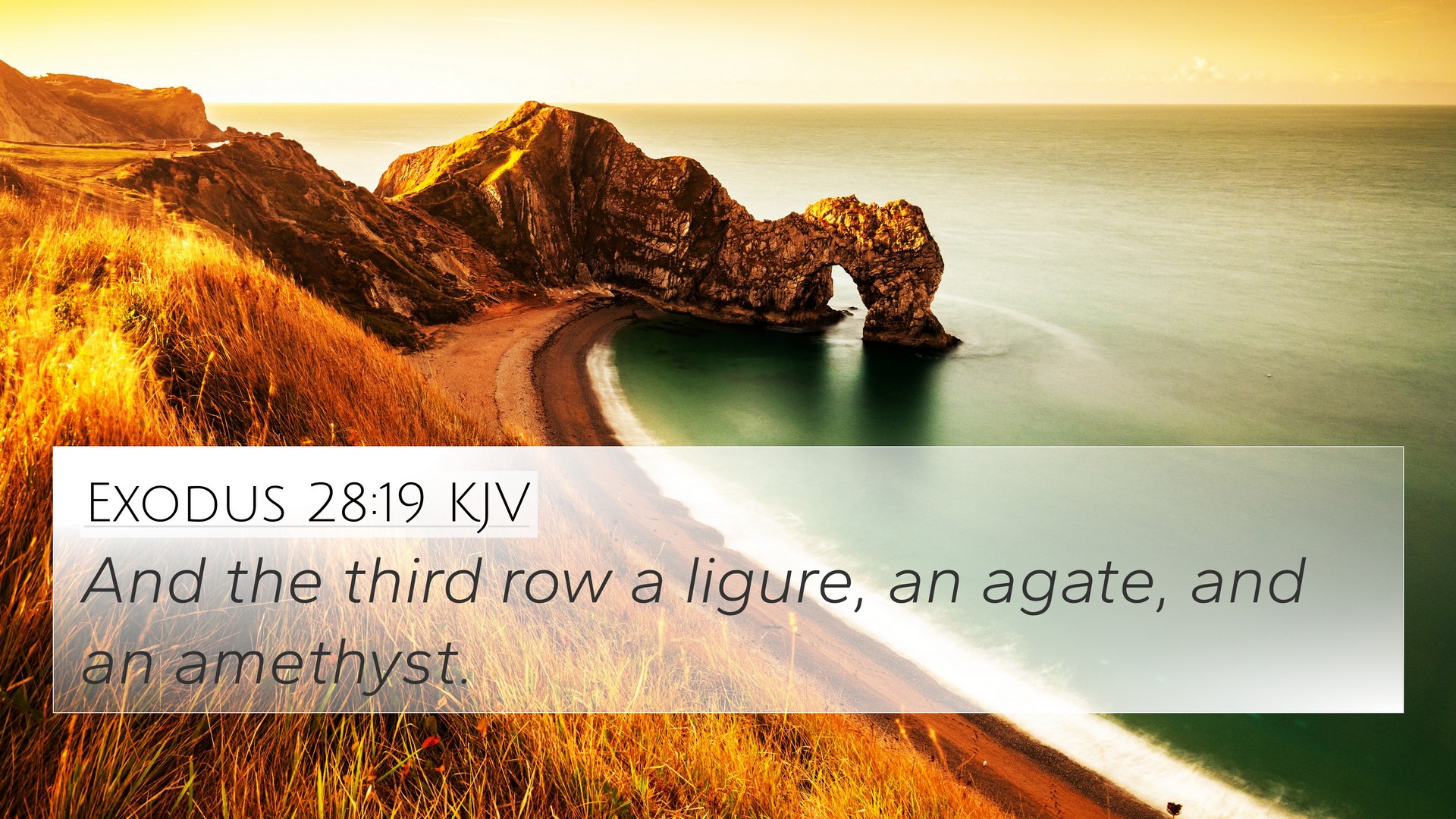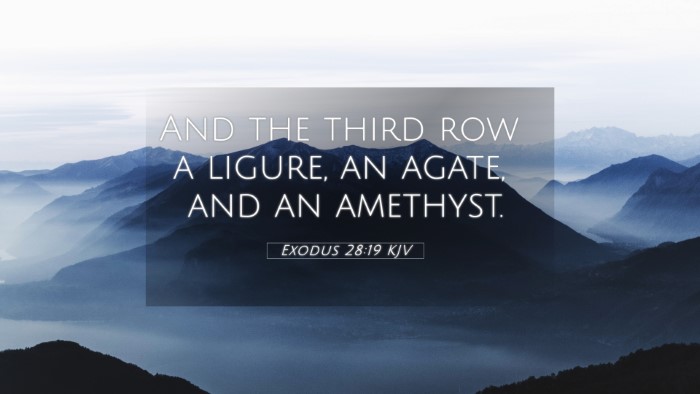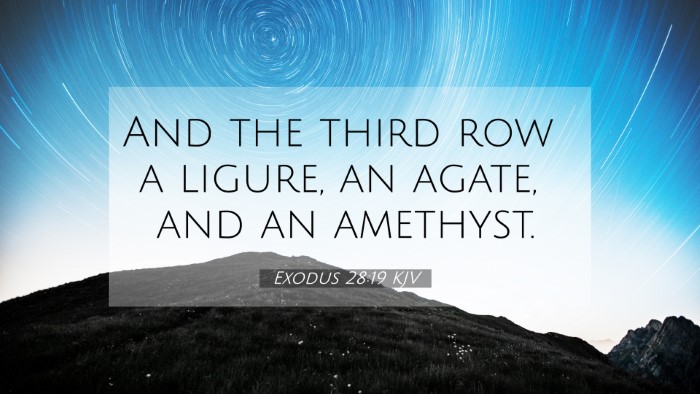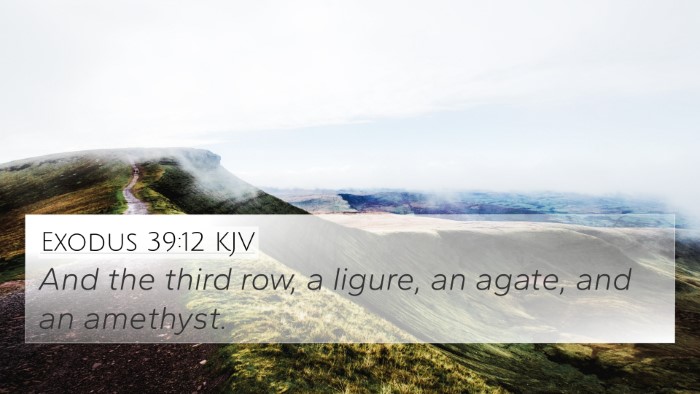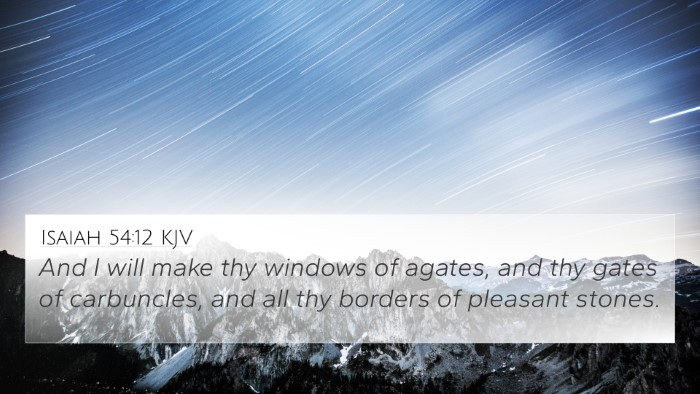Understanding Exodus 28:19
Exodus 28:19 states: "The third row shall be a jacinth, and a gate, and an amethyst." This verse is part of the instructions given to Moses regarding the high priest's garments, particularly the breastplate adorned with precious stones. Each stone signifies various meanings, and the arrangement holds theological significance.
Summary of Verse Meaning
This verse describes one of the elements of the high priest's breastplate, specifically the stones that represent the twelve tribes of Israel. The choice and arrangement of the stones symbolize the unity and diversity of the Israelite people as they come before God.
Insights from Public Domain Commentaries
- Matthew Henry: Henry emphasizes the significance of the stones and the fact that they were set in gold, symbolizing purity and value. The inclusion of jacinth, a gate, and amethyst suggests the importance of being ushered into God's presence with beauty and splendor.
- Albert Barnes: Barnes notes that each stone carries implications of beauty and worth, representing the people of God. The specific stones can connect to deeper meanings, such as faithfulness and hope, reinforcing the high priest's role as an intercessor for Israel.
- Adam Clarke: Clarke highlights that the choice of these particular stones and their arrangement underlines the divine acknowledgment and memory of the tribes. He discusses the historical and cultural significance of gemstones, linking them to the majesty of God's creation.
Related Bible Verse Cross-References
- Exodus 28:17-21: Discusses the complete arrangement of the stones.
- Revelation 21:19-21: Describes the New Jerusalem with similar precious stones.
- 1 Peter 2:9: Refers to believers as a chosen generation, highlighting divine relationships.
- Isaiah 54:11-12: Offers imagery of precious stones in reference to God's restoration.
- Psalm 127:1: Speaks to the importance of God's involvement in building up His people.
- Hebrews 9:11-12: Connects the role of the high priest to Christ's ultimate intercession.
- Ephesians 2:19-22: Discusses believers being built into a spiritual house, reflecting on the concept of God dwelling among His people.
Thematic Bible Verse Connections
The themes encapsulated in Exodus 28:19 can be connected to various other scriptures that discuss God's presence, the beauty of His creation, and the representation of His people. This theme of representation resonates throughout biblical texts, as seen in:
- Philippians 3:20: Our citizenship is in heaven, indicating our identity in Christ.
- Matthew 5:14: Being the light of the world reflects our role as representatives of God's glory.
- Romans 12:1: Presenting ourselves as living sacrifices aligns with the high priest’s role.
Cross-Referencing Biblical Texts
Using tools for Bible cross-referencing can enhance our understanding of Exodus 28:19. By identifying connections between this verse and others, we can deepen our theological insights:
- How to use Bible cross-references: Engaging in cross-reference Bible study helps illuminate different aspects of God's covenant with His people.
- Bible reference resources: Utilizing a Bible concordance can assist in tracing the significance of gemstone imagery throughout Scripture.
- Bible chain references: Following themes around priesthood and intercession highlights the consistency of God's plan across scriptures.
Conclusion
Exodus 28:19 serves as a reminder of the importance of representation in the divine plan. The high priest's breastplate not only showcases the beauty of God's creation but also illustrates the unity of God's people before Him. Through comparative Bible verse analysis and an understanding of cross-referencing biblical texts, we can appreciate the interconnectedness of God's message across the Scriptures.
This verse encourages us to explore deeper connections between the Old and New Testament, recognizing the thematic parallels that reveal God's narrative throughout history. Understanding these verses in relation to each other helps us grasp the immense value God places on His people and our relationship with Him.
